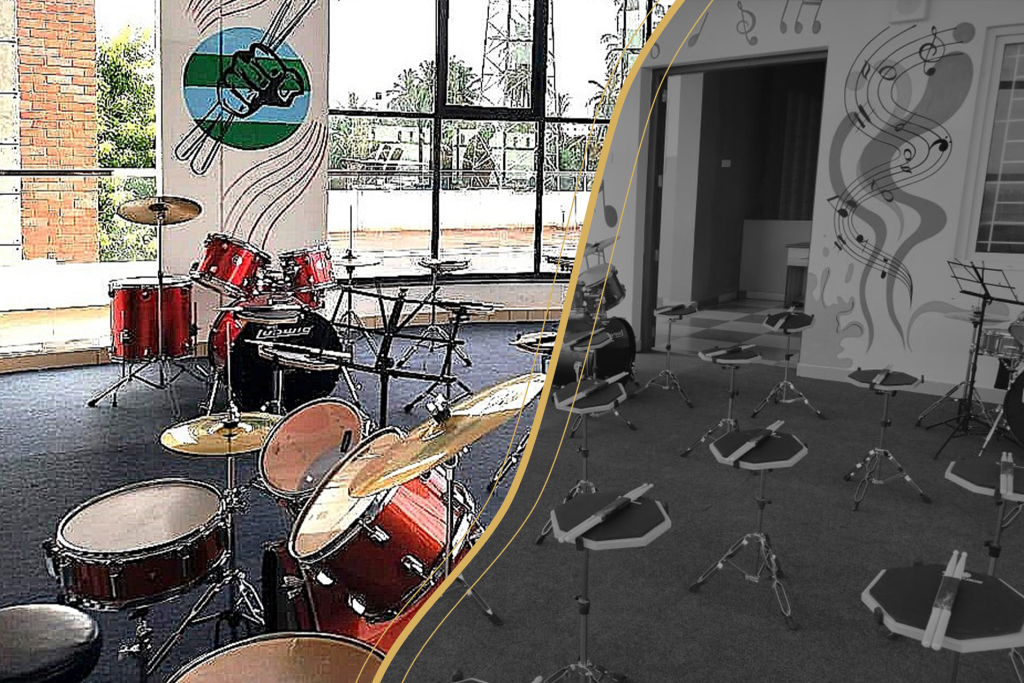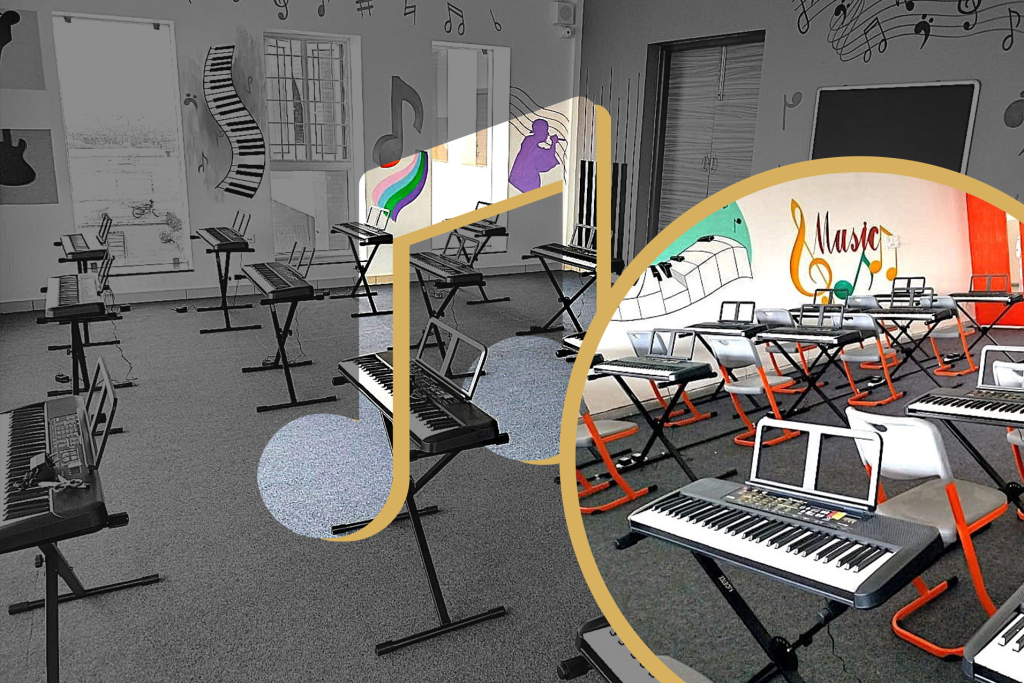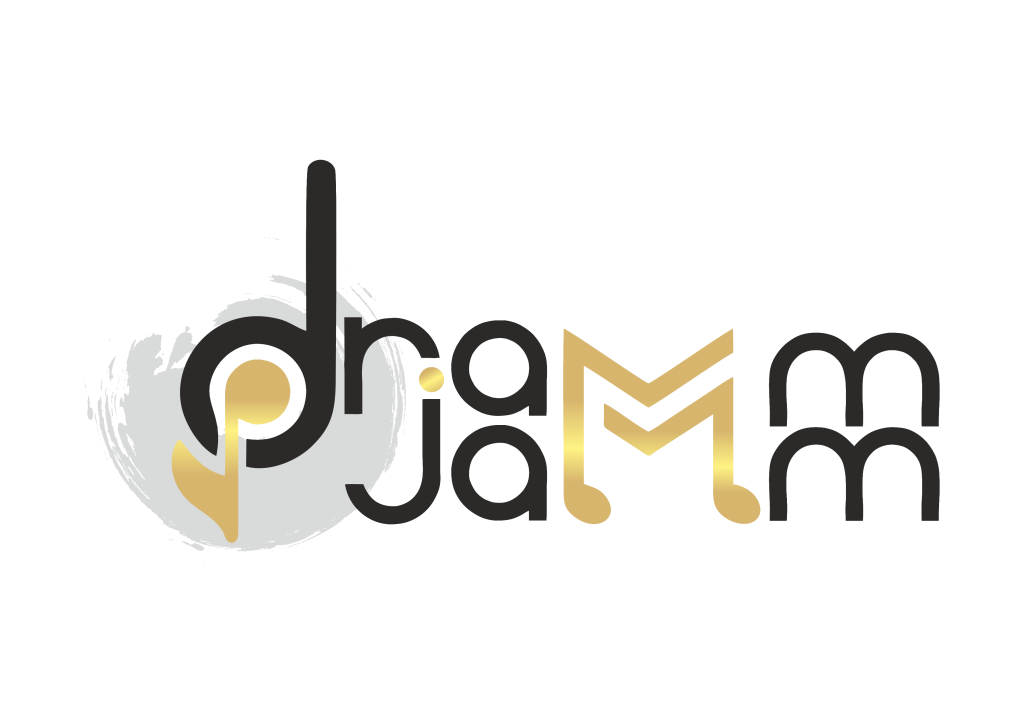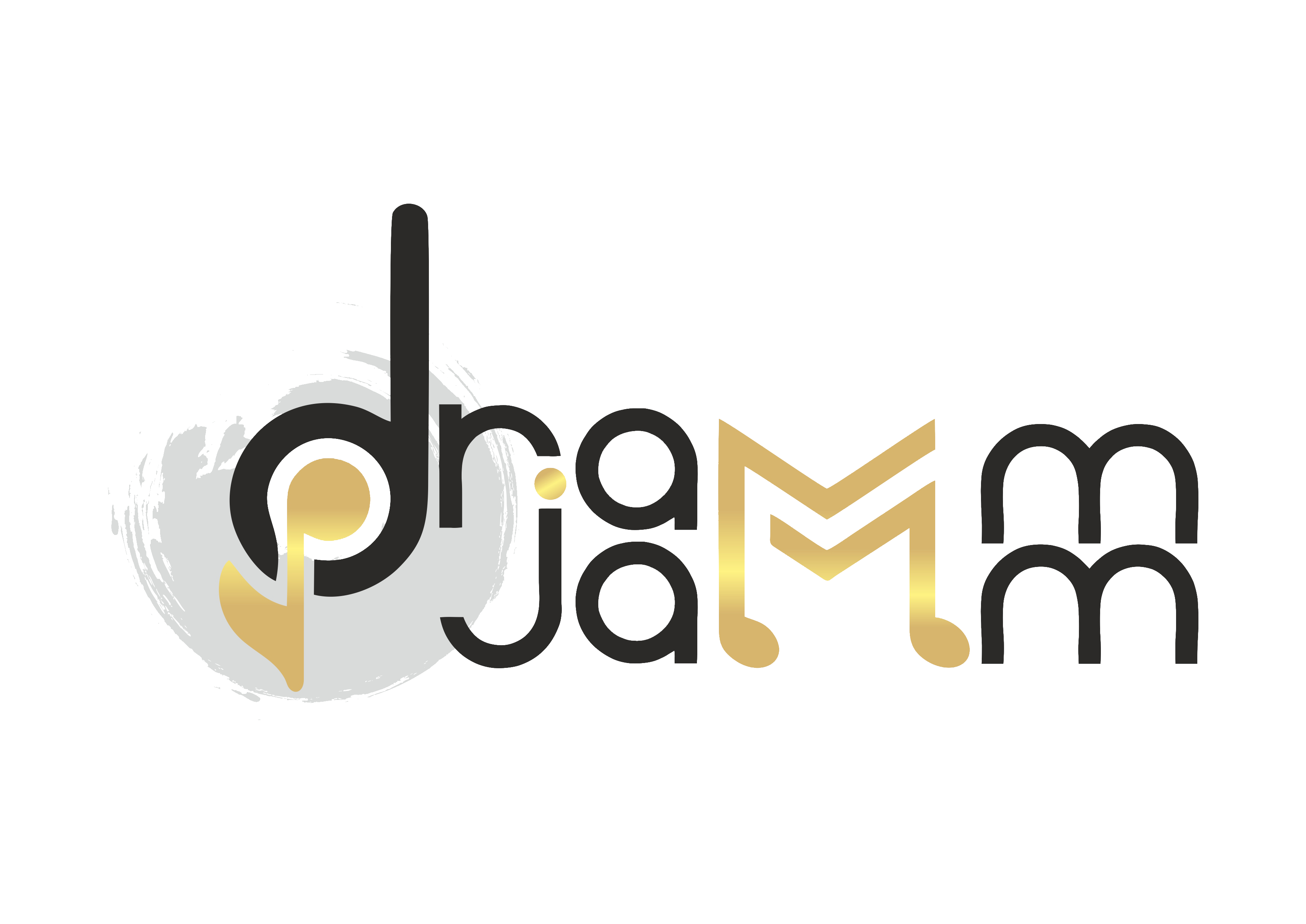Music Education
We at DrammJamm believe that every child deserves access to high-quality music education, taught by qualified and well-trained music teachers. Introducing music in the early childhood years can help foster a positive attitude towards learning and curiosity. Music is the fabric of our society. It shapes ability, character and greatly contributes in students’ intellectual development.
Features Of The Program
- Power packed immersive curriculum as per NEP 2020.
- Well-designed and customized syllabus integrated with core-subjects and school timetable.
- Class conducted by highly qualified, experienced & skilled music teachers who are subject matter experts.
- Innovative, activity & play-way based “Kids Curriculum” program with 1 session conducted per week.
- Workshops/Interactive sessions by eminent artists from the industry.
- Students’ assessment & certification at the end of the academic year for all the participants along with assistance during Annual Day and/or event for the culmination of the program year.
- State of the art MUSIC ROOMs dedicated to 1 instrument per room (Keyboard/Drums/Guitar).
- Complete music room set-up including maintenance of the instruments with an Instrument-to-Student ratio of 1:1.
- Creation of School Bands for morning assemblies, Inter-house, Inter-school & National level competitions.
- Exclusive “Music Summer Workshops” for students (Optional).
- The program curriculum covers following instruments.
- Keyboard
- Drums
- Guitar
- Ukulele
- Tabla
- Recorder
- Hindustani Vocals
- Western Vocals
Complete room designing including Wall-Art,
branded instruments & maintenance of the
instruments.
School as well as Parents need not to spend anything extra on Instruments.
School as well as Parents need not to spend anything extra on Instruments.
NEP 2020 BASED-CURRICULUM: 8 Levels of
curriculum: 1 Academic Year = 1 Level of
Instrumental learning.
Instruments Covered: Keyboard, Drums, Guitars, Ukulele, Hindustani Vocals & Western Vocals.
Instruments Covered: Keyboard, Drums, Guitars, Ukulele, Hindustani Vocals & Western Vocals.
No Investment from school’s side.
Maintenance of the instruments is covered: Immediate replacement of damaged/broken instruments.
Maintenance of the instruments is covered: Immediate replacement of damaged/broken instruments.
Class conducted by highly qualified,
experienced & skilled music Instructors who
are subject matter experts.
Thorough background check mandatory for each and every instructor.
Thorough background check mandatory for each and every instructor.
As a part of the program, Students get trained for
Morning Assembly, Choirs, Annual Day, Special
Assemblies, School Events, Inter-School
Competitions, State & National Level Competitions.
Creation of multiple School Bands (House-Wise).
Creation of multiple School Bands (House-Wise).
Every music lab is equipped with 20-30 instruments
to ensure every student gets hold of 1 instrument.
Students are not required to carry any instrument from home.
Students are not required to carry any instrument from home.


Benefits Of Music Education
- Learning Benefits- The brain works by electrical current thereby needing oxygen and water to function well. Movement (dance) helps to provide one of these two elements, oxygen. Another wonderful thing happens with movement. The brain produces a neuro-chemical called endorphins. This chemical causes a feeling of energy and makes the brain more conducive to learning
- Behavioral Changes – Dance can help calm children that suffer with hyperactivity disorders as well as those that suffer from self-destructive behaviors. The act of dance seems to help calm and focus these troubled young minds.
- Physical Development: Dance will help develop muscles, tone the body, improve circulation, improve posture, balance, coordination and promote greater flexibility.
- Musical training helps develop language and reasoning: Students who have early musical training will develop the areas of the brain related to language and reasoning. The left side of the brain is better developed with music, and songs can help imprint information on young minds.
- Academic Achievement: A study about SAT exam showed that those who had experience with musical instruments scored 63 points higher on verbal skills and 44 points higher on Maths compared to those who did not have any such experience.
- A mastery of memorization: Even when performing with sheet music, student musicians are constantly using their memory to perform. The skill of memorization can serve students well in education and beyond.
- Coordination upskilling- Increased hand-eye coordination and improved fine motor skills. Students who can perform complex rhythms can also make faster and more precise corrections in many academic and physical situations.
- Success in society: Students in band or orchestra are less likely to abuse substances over their lifetime. Musical education can greatly contribute to children’s intellectual development as well.
- Emotional development: Students of music can be more emotionally developed, with empathy towards other cultures They also tend to have higher self-esteem and are better at coping with anxiety.
- Students learn pattern recognition: Children can develop their math and pattern-recognition skills with the help of musical education. Playing music offers repetition in a fun format.
- Fine-tuned auditory skills: Musicians can better detect meaningful, information-bearing elements in sounds, like the emotional meaning in a baby’s cry. Students who practice music can have better auditory attention, and pick out predictable patterns from surrounding noise.
- Music builds imagination and intellectual curiosity: Introducing music in the early childhood years can help foster a positive attitude toward learning and curiosity. Artistic education develops the whole brain and develops a child’s imagination.
- Music is an amazing stress reliever: Playing music is an amazing way to get your minds off things. Students can fight stress by learning to play music. Soothing music is especially helpful in helping kids relax.
- Preparation for the creative economy: Investing in creative education can prepare students for the 21st century workforce. The new economy has created more artistic careers, and these jobs may grow faster than others in the future.
- Development in creative thinking: Kids who study the arts can learn to think creatively. This kind of education can help them solve problems by thinking outside the box and realizing that there may be more than one right answer.
- Music can develop spatial intelligence: Students who study music can improve the development of spatial intelligence, which allows them to perceive the world accurately and form mental pictures. Spatial intelligence is helpful for advanced mathematics and more.
- Kids can learn teamwork: Many musical education programs require teamwork as part of a band or orchestra. The ability to listen to what everyone is playing and blend seamlessly translates to collaboration. In these groups, students will learn how to work together and build camaraderie.
- Better self-confidence: With encouragement from teachers and parents, students playing a musical instrument can build self-esteem and confidence. Musical education is also likely to develop better communication and connect for students.
- Music is fun: Last but definitely not least -Playing music is fun. It is a very healthy addiction which changes the complete outlook of students and brings positivity.
Features Of The Program
- Power packed immersive curriculum as per NEP 2020.
- Well-designed and customized syllabus integrated with core-subjects and school timetable.
- Class conducted by highly qualified, experienced & skilled music teachers who are subject matter experts.
- Innovative, activity & play-way based “Kids Curriculum” program with 1 session conducted per week.
- Workshops/Interactive sessions by eminent artists from the industry.
- Students’ assessment & certification at the end of the academic year for all the participants along with assistance during Annual Day and/or event for the culmination of the program year.
- State of the art MUSIC ROOMs dedicated to 1 instrument per room (Keyboard/Drums/Guitar).
- Complete music room set-up including maintenance of the instruments with an Instrument-to-Student ratio of 1:1.
- Creation of School Bands for morning assemblies, Inter-house, Inter-school & National level competitions.
- Exclusive “Music Summer Workshops” for students (Optional).
- The program curriculum covers following instruments
- Keyboard
- Drums
- Guitar
- Ukulele
- Tabla
- Recorder
- Hindustani Vocals
- Western Vocals

DrammJamm Education is a registered company certified by ISO & MSME and listed on the Government of India’s GeM portal, providing formal curriculum-based learning in Music, Dance & Theatre to schools across India.
About Us
© Copyright DrammJamm – 2023, All Rights Reserved | Developed By Wemonde

